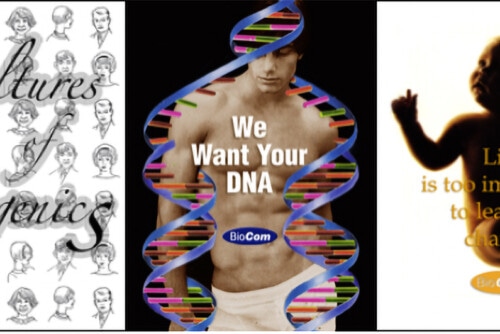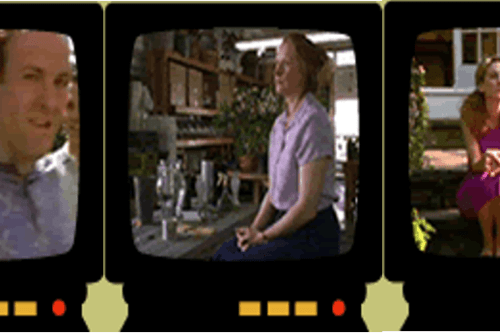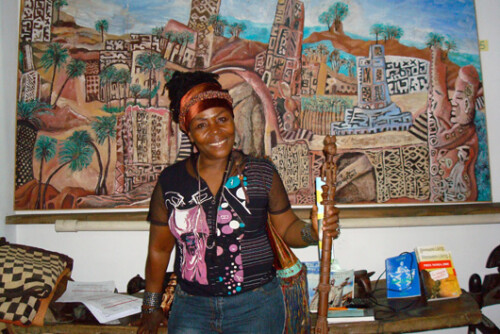This article is a response to Claudia Castañeda’s “Adopting Technologies: Producing Race in Trans-racial Adoption” and Jessaca Leinaweaver’s “Adoption and the Politics of Modern Families” in this issue.
I sit on the porch of a rented bungalow in the Catskills, watching my nine-year-old daughter play with a Playmobil camper—little plastic white people, a big camping trailer, the kind I associate with middle America on summer vacation. The camper set was a gift from my sister’s mother-in-law; my daughter has been playing with it, by herself, whenever she’s not running around like a wild thing with the two other girls she’s befriended here. As the plastic white people sit around their tiny picnic table, eating their miniature hot dogs, I remember how, when we looked at the website photos of this somewhat run-down, old-fashioned bungalow community, she asked me, “how come most of them are white people?”
I had asked the owners pretty much the same question. Satisfied that it was multi-cultural “enough” for us and our friends to feel “comfortable”—there were a couple of biracial families, various friends of color visiting, a “progressive” vibe—I asked her, “Do you think we should we go even though it doesn’t looked very mixed?” She responded, “Yeah. I guess so. It looks pretty. They have a pool.” So here we are, sitting on the porch in a summer community where she is currently the only child of color, and we are the only biracial family, and as I write I find myself wondering: if I were raising a white child, would she have noticed that it didn’t look “right,” and would I have taken so much care to be sure that she did?
Such questions come into focus reading the very generative papers in this issue by Jessaca Leinaweaver and Claudia Castañeda about the politics and technologies of race, love, and suffering in transnational and transracial families. When I was asked to comment on these papers, I was intrigued, but apprehensive. I am a white, single, American adoptive parent of a nine-year-old Guatemalan daughter. I am a feminist professor and a psychotherapist, and adoption is neither my academic nor clinical specialty—yet I think about it all the time. This seemed like an opportunity to grapple with critical issues at once personal and political (the intrigue), in a very public way (the apprehension). My own daughter is not at all sure she wants me writing about this subject; she alternately believes it is “none of anyone’s beeswax,” and understands the important, if confusing to her, reasons for sharing our stories.
“Adoption and the Politics of Modern Families” by Leinaweaver, and “Adopting Technologies: Producing Race in Trans-racial Adoption” by Castañeda, call on “us” (read: academics/ feminists/ adoptive parents / white people) to recognize the deep inequalities that penetrate transnational and transracial adoption, to acknowledge that these are built upon what Leinaweaver calls the “unstable foundation of other people’s suffering” and Castañeda refers to as the adoptive child’s “conditions of birth.” These authors challenge the dominant discourse of “saving” needy children through transnational-transracial adoption, and question the ways what David Eng has called “new global families” may do the ideological work of naturalizing racial oppression and global injustices—or un-do it. I’d like to consider their papers in terms of how they can contribute to the radical, political, project of raising consciousness of racism and exploitation among their white, middle-class subjects in support of what Eng terms an “ethical multiculturalism,” and whether their insights hold potential for mobilizing adoptive families around global and local movements for social and economic justice—good work for feminists. 1
Leinaweaver’s paper sets out to address the “politics of the modern family”—a big topic. Taking the reader through maids from the Caribbean and surrogates in India, she arrives at transnational adoption, with a focus on pop icon Madonna and her adoption of children from Malawi. It’s here that I’ll concentrate my comments. Following Shellee Colen’s (1995) concept of “stratified reproduction,” Leinaweaver brings into view the ways global inequalities of power and wealth serve to break down (“disassemble”) families in some nations (primarily the global South), while providing adoptable children to “make” families in others (the global North), and she reiterates some of the unacknowledged ways in which the privileged create and sustain our lives through the labor, including the reproductive labor, of the poor in the intimate, political spaces of the family. 2
Leinaweaver frames her argument about adoption with Colen’s study of “Manhattan mothers” and their use of West Indian nannies to care for their homes and children. Drawing a parallel between power relations in adoption and domestic work, she makes a valuable intervention into discourse that often substitutes the good intentions of adoptive parents for attention to the needs, capacities, and human rights of mothers in impoverished “sending” nations. Hers is fundamentally an ethical argument about certain forms of family, reproductive labor, and transnational adoption. I was disappointed, then, to find Leinaweaver undermine the strength of her argument by choosing a rhetorical strategy that relies on the figure of the white, professional, “Manhattan mother,” along with that of pop icon Madonna, to critique transnational adoption. This limited sample of adoptive mothers stands in for transnationally adopting parents more broadly, and Leinaweaver’s argument directs us toward women as key beneficiaries and perpetrators of other women’s exploitation. The well-off “Manhattan moms” make easy marks: she points to them as self-congratulatory women who often desire a child as a fashionable “commodity,” and are resistant to seeing their own choices as “made at the expense of another woman’s reproductive integrity.” This rhetoric extends to feminists who, she contends in a striking generalization, tend to find arguments about the global inequalities that undergird new family configurations “upsetting” because they “are convinced that these ‘choices’ are the only ones that will allow them to do what they want to do”. 3 By targeting self-serving families led by “Manhattan mothers” and celebrities, as well as feminists who turn a blind eye to other women’s suffering, Leinaweaver misses the opportunity to call to account the government policies and agency practices around transnational adoption that guide adoptive families toward particular countries, and support deep, structural inequality, injustice, and corruption.
Leinaweaver’s language betrays a deep (and understandable) impatience for privileged white parents (read: women) who adopt without regard to ethics, history, or material conditions, and for the entitlement of a (female) celebrity able to bypass law and custom to adopt in Malawi. I am not unsympathetic to this feeling (though I object to what reads as implicit woman-blaming, despite Leinaweaver’s attempt to guard against it). Just recently, in the “Lives” column of the Sunday New York Times Magazine, a Brandeis University poetry fellow, Melanie Braverman, wrote a stunningly solipsistic essay about her response to her young adopted son’s first questions about his birth mother: “To Molly and me, our children are so completely ours it feels impossible that anyone else had anything to do with them.” 4 Though she notes that her son was drawn to the romantic notion that he came from an (unnamed—Caribbean? Asian?) island, and was just beginning to show interest in the fact that another mother gave birth to him, she herself is happy to completely erase the first mother as no more than a vehicle, telling her two adopted sons “the truth as I see it: ‘Some babies come out of their mommies, and some come through other bodies to get to their mommies. My body couldn’t make babies, so we had to find another way to get you here.'” 5
Braverman acknowledges that her five-year-old must begin to create his own narrative of origins, but so contented is she with the “relentless perfection” of their summer (and their lives), she seems unable to recognize what he himself names: the terrible distance he traveled (metaphorically and literally) to get from his first to these second mothers: “… they weren’t my mommies … I swam a hundred miles to get home,” he tells his friend. 6 In crafting a narrative to shield their children, and apparently especially themselves, from the truly difficult and complicated “truths” at the heart of adoption, Braverman and her partner have done violence to another woman’s story—and to their child’s story. Theirs is a balder version of the sentimental, “you were meant to be my baby” narrative embraced by many adopters trying to naturalize their non-biological, affective tie to their child (and sometimes to rationalize years of failed infertility treatments); this story implies, of course, that another woman, somewhere, was “meant” to have a baby that she would relinquish to complete the happy adoptive family in the U.S. (Braverman’s essay rightly occasioned many angry, online comments from other adoptive parents who have struggled to create narratives that honor the place of another mother in their family’s collective psyche.) 7
- David Eng, “Transnational Adoption and Queer Diasporas,” Social Text 21.3 (2003): 1-37.[↑]
- See Leinaweaver.[↑]
- See Leinaweaver.[↑]
- Melanie Braverman, “An Adopted Boy Considers His Origins,” New York Times Magazine 3 September 2010.[↑]
- Ibid.[↑]
- Ibid.[↑]
- Reader comments to Melanie Braverman’s “An Adopted Boy Considers His Origins.” [↑]



